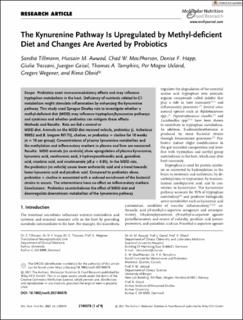The Kynurenine Pathway Is Upregulated by Methyl-deficient Diet and Changes Are Averted by Probiotics
Tillmann, Sandra; Awwad, Hussain M.; MacPherson, Chad W.; Happ, Denise F.; Treccani, Giulia; Geisel, Juergen; Tompkins, Thomas A.; Ueland, Per Magne; Wegener, Gregers; Obeid, Rima
Journal article, Peer reviewed
Published version

Åpne
Permanent lenke
https://hdl.handle.net/11250/2991066Utgivelsesdato
2021Metadata
Vis full innførselSamlinger
- Department of Clinical Science [2318]
- Registrations from Cristin [9791]
Sammendrag
Scope
Probiotics exert immunomodulatory effects and may influence tryptophan metabolism in the host. Deficiency of nutrients related to C1 metabolism might stimulate inflammation by enhancing the kynurenine pathway. This study used Sprague Dawley rats to investigate whether a methyl-deficient diet (MDD) may influence tryptophan/kynurenine pathways and cytokines and whether probiotics can mitigate these effects.
Methods and Results
Rats are fed a control or MDD diet. Animals on the MDD diet received vehicle, probiotics (L. helveticus R0052 and B. longum R0175), choline, or probiotics + choline for 10 weeks (n = 10 per group). Concentrations of plasma kynurenine metabolites and the methylation and inflammatory markers in plasma and liver are measured.
Results
MDD animals (vs controls) show upregulation of plasma kynurenine, kynurenic acid, xanthurenic acid, 3-hydroxyxanthranilic acid, quinolinic acid, nicotinic acid, and nicotinamide (all p < 0.05). In the MDD rats, the probiotics (vs vehicle) cause lower anthranilic acid and a trend towards lower kynurenic acid and picolinic acid. Compared to probiotics alone, probiotics + choline is associated with a reduced enrichment of the bacterial strains in cecum. The interventions have no effect on inflammatory markers.
Conclusions
Probiotics counterbalance the effect of MDD diet and downregulate downstream metabolites of the kynurenine pathway.
